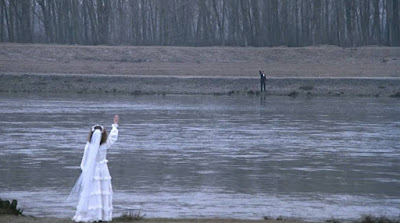The Wild Swans at Coole
The trees are in their autumn beauty,
The woodland paths are dry,
Under the October twilight the water
Mirrors a still sky;
Upon the brimming water among the stones
Are nine-and-fifty swans.
The nineteenth autumn has come upon me
Since I first made my count;
I saw, before I had well finished,
All suddenly mount
And scatter wheeling in great broken rings
Upon their clamorous wings.
I have looked upon those brilliant creatures,
And now my heart is sore.
All's changed since I, hearing at twilight,
The first time on this shore,
The bell-beat of their wings above my head,
Trod with a lighter tread.
Unwearied still, lover by lover,
They paddle in the cold
Companionable streams or climb the air;
Their hearts have not grown old;
Passion or conquest, wander where they will,
Attend upon them still.
But now they drift on the still water,
Mysterious, beautiful;
Among what rushes will they build,
By what lake's edge or pool
Delight men's eyes when I awake some day
To find they have flown away?
William Butler Yeats
I cigni selvatici a Coole
Gli alberi sono nella loro bellezza autunnale,
i sentieri del bosco sono asciutti,
nel crepuscolo di ottobre l'acqua
riflette un cielo immobile;
sull'acqua fra le pietre
ci sono cinquantanove cigni.
È questo il diciannovesimo autunno
da quando la prima volta li contai;
li vidi, prima che finissi il conto,
tutti all'improvviso alzarsi
e disperdersi volteggiando in grandi cerchi spezzati
sulle ali rumorose.
Ammirai quelle splendenti creature
e ora il mio cuore è triste.
Tutto è cambiato da quando io,
ascoltando al crepuscolo
la prima volta, su questa riva,
lo scampagnio delle loro ali sopra il mio capo,
camminavo con passo più leggero.
Instancabili, amata e amante,
remano nelle fredde
correnti amiche o scalano l'aria;
i loro cuori non sono invecchiati;
passione o conquista ancora li accompagna
nel loro errante vagare.
Ma ora si lasciano andare sull'acqua immobile,
misteriosi, stupendi.
Fra quali giunchi costruiranno il nido,
su quale sponda di lago o stagno
incanteranno occhi umani quando al risveglio
un giorno scoprirò che son volati via?
William Butler Yeats
Les Cygnes Sauvages de Coole
Les arbres dévoilent leur beauté d’automne,
Surplombant les secs chemins forestiers,
L’eau sous le crépuscule d’octobre
Reflète un ciel qui semble figé.
Sur l’eau qui court entre les galets
Cinquante neuf cygnes se sont posés.
C’était là le dix-neuvième automne,
Depuis que je m’étais mis à les compter.
J’ai vu, avant même d’avoir terminé,
Tous les cygnes, soudainement s’élever,
S’éparpiller, tournoyant en de larges anneaux brisés,
A grands coups d’ailes qui claquaient.
J’ai admiré ces créatures brillantes
Et maintenant mon coeur se crève.
Tout à changé depuis ce crépuscule où j’ai entendu,
Pour la première fois sur cette grève,
Le tintement de leurs ailes au dessus de moi,
Et en marchant s’allégeaient mes pas.
A jamais inlassables, en couple d’âmes soeurs,
Ils s’ébattent dans les vents propices
Et froids, ou gagnant de l’altitude.
Leurs coeurs jamais ne vieillissent.
Passion et hardiesse les attendent sur le chemin
Où que les emmène le destin.
Mais les voilà maintenant glissant sur le miroir de l’eau,
Ils sont beaux et intriguants .
Parmi quels joncs trouveront-ils refuge?
Au bord de quel lac, de quel étang
Fascineront-ils les passants, quand je me réveillerai un matin
Pour découvrir qu’ils sont partis au loin ?
William Butler Yeats
Los cisnes salvajes en Coole
Los árboles están en su belleza otoñal,
Los senderos del bosque están secos
Bajo el crepúsculo de octubre el agua
Refleja un cielo quieto;
Sobre el agua rebosante entre las piedras
Son cincuenta cisnes.
Me ha llegado el decimonoveno otoño
Desde que hice la cuenta por primera vez;
Vi, antes de haber terminado bien,
Todos montan de repente
Y esparcirse girando en grandes anillos rotos
Sobre sus alas clamorosas.
He mirado a esas criaturas brillantes,
Y ahora me duele el corazón.
Todo ha cambiado desde que escuché en el crepúsculo
La primera vez en esta orilla
El batir de campana de sus alas sobre mi cabeza,
Pisado con una pisada más ligera.
Incansable todavía, amante por amante,
Reman en el frio
Corrientes acompañantes o escalar el aire;
Sus corazones no han envejecido;
Pasión o conquista, vagar por donde quieran,
Atiende a ellos todavía.
Pero ahora flotan en el agua quieta
Misterioso, hermoso;
Entre qué juncos construirán,
Por la orilla del lago o la piscina
Deleita los ojos de los hombres cuando despierte algún día
Para encontrar que se han ido volando?
William Butler Yeats
Coole’un Yaban Kuğuları
Ağaçlar güz güzellliğinde,
Korunun yolları kuru,
Ekim’in alacakaranlığında
Duru bir göğü yansıtıyor sular;
Taşların üzerinden akan sularda
Elli dokuz kuğu.
Bu geçirdiğim on dokuzuncu güz
Hesabını tuttuğumdan bu yana;
Daha saymayı bitirmeden, baktım,
Birden havalanıyorlar
Ve döne döne dağılıyorlar
Gürültülü kanatlarıyla.
Öyle baktım da o parlak yaratıklara
Şimdi yüreğim yaralı.
Her şey değişmiş alacakaranlıkta
Duyduğumdan beri, ilk kez bu kıyıda,
Kösnüyle çırparken kanatlarını başımın üstünde,
Daha yumuşaktı uçuşları.
Hâlâ bıkmadan sevgililer birer birer
Ya soğuk dost derelerde yüzüyor,
Ya da havalanıyorlar;
Gönülleri yaşlanmamış;
Tutku ya da elde etme isteği,
Nereye giderlerse gitsinler, hâlâ yüreklerinde.
Hâlâ yüzüyorlar işte durgun sularda,
Gizem içinde, güzel;
Kim bilir hangi sazlıkta
Yapacaklar yuvalarını, hangi gölün
Kıyısında ya da havuzda, güzelliklerini sunacaklar
Uyanıp onların gittiğini anladığımda?
William Butler Yeats
Çeviri: Cevat Çapan
 |
| Lake Bolsena, Viterbo, Italy, by Alice |











